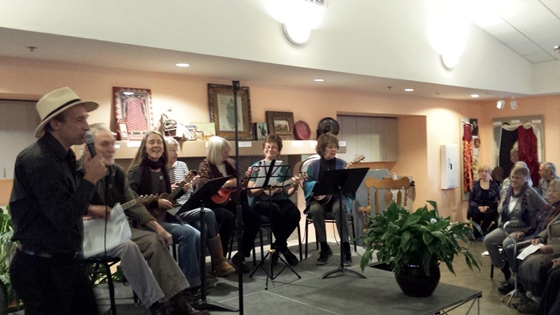— by Margie Doyle —
When presented with the petition circulated by the Coalition for Orcas Health Care (COHC), an initiative to form a public health taxing district, I was put off by its legal title: a Public Hospital Taxing District. Would I support another taxing district to build a hospital on this island of 5,000 people? No sir.
I was wrong.
As explained to me and other Orcas Issues readers, to establish a Public Hospital District is NOT a first step to building a hospital, rather as Art Lange stated: “There is no intent to build a hospital on Orcas. By state law, the definition of a Public Hospital District means a public health services district…. health services for everyone.”
And so, after attending UW Medicine’s Town Hall last Thursday, I instead became hopeful that health care on the island could be achieved with some reliability and sustainability. The next step towards that achievement is the members of our community coming together to discuss the creation of a Public Health District (PHD), and electing five PHD Commissioners who, by law, would be responsible for determining the levy rate, which providers would receive assistance, and how much they would receive.
The Coalition for Orcas Healthcare (COHC), a group of concerned citizens, is collecting signatures on a petition to put the question on the ballot for April, 2018 so that we can all participate in a thorough public discussion over the next 7 months. The Coalition will be facilitating many public discussions and also will be providing information in the media regarding the measure so that we can all make an informed decision when we vote in April, 2018.
Art Lange, Communications Lead for the COHC, writes, “The Coalition, while recognizing that the Commissioners by law would be responsible for making these decisions, supports the ideas that: 1) the members of our community need to ensure that high quality primary and urgent care (including after-hours care) will be available to everyone in a financially sustainable and predictable manner now and for generations to come and 2) that means that all the existing primary/urgent care practices should receive support from a PHD.”
Signing the petition is signing something that says you’re interested in exploring what a public health district would look like for the voters to decide upon in seven months. Part of being a responsible citizen is making those little, sometimes counter-intuitive steps so that you can achieve your goal.
Perhaps Dave Mowrey says it best, “I am not up on all of the issues, but signing a petition only gets it on the ballot. For it to pass an election, it will require getting voters behind the issue. Something that is historically hard to do on Orcas. I will sign the petition. I cannot say I will vote for it, but I will do my part to make our Democratic process work.”
We islanders seemed to be united in the need for a replacement for the Orcas Medical Center’s services. Like many institutions on the island, the Medical Center was a weird animal, the building and land owned by a private non-profit; the medical services overseen since 2011 by an off-island, out-of-county hospital, regulated by thousands of state and federal rules; and paid for by:
- insurance company reimbursements, including Medicare and Medicaid
- government subsidies, such as the one for rural facilities
- co-pays by patients
- philanthropic contributions, especially significant in the case of the Orcas Medical
Center
Concurrently, at least two other medical practices have provided patient care; while at least three doctors ceased their medical practice on the island. With the “pull-out” of Island Hospital this year, islanders were left with a situation that was addressed by a “philanthropic-investment-11th hour” funding drive for $750,000 that resulted in the agreements, effective Sept. 11, 2017 for the Orcas Medical Center to be leased to UW Physicians and operated by UW Medicine as Orcas Clinic.
Now islanders have achieved several of their immediate goals: an island medical clinic that will see patients six days a week and provide for “after-hours” care in the form of consultations (much as those familiar with Group Health’s “Consulting Nurse” phone lines may recall), and negotiations still in process to bring in other island physicians.
Whew, and a pat on the back to those involved (not this innocent bystander).
Okay. And so to assure we don’t go through this exercise repeatedly to secure reliable medical the question must be addressed: How do we sustain this medical clinic whose budget analysis (pro forma) indicates deficits in excess of $500,000?
We’re not alone in this dilemma. Tunnel vision is one of the subtle ‘luxuries’ of living on Orcas Island, but as pediatrician Dr. Dale Heisinger, who heads the COHC says, the problem of sustainable rural medical practices is acute throughout the country. We have bought some time with the establishment of UW Medicine’s Orcas Clinic. But this is a first for UW Medicine too, as all other Clinics are in urban or suburban areas — such as Factoria, Smokey Point (Arlington) and Federal Way. And it is likely that Orcas Clinic will always maintain a deficit, while still providing quality, reliable health care on a sustainable basis.
As citizens of Orcas Island, we understand the need for a long-term solution — which after a seven-month discussion may or may not be a taxing district, but we can vote on it then. The selection of Commissioners, the inclusion of all medical practices, the establishment of a taxing rate, can be discussed with the goal of a solution in the form of a public health district. Surely the public supports having those discussions in the next seven months. As the late Gene Knapp, County Prosecutor and Commissioner said, “Orcas Islanders are nothing if not opinionated. Apathy is not a problem here.”
As responsible 21st century citizens, we can translate our concerns, our ideas, and even our ultimatums into a plan over the next seven months that we can then accept or reject by our votes.
Do what you can, when an opportunity presents itself. And now that there are sufficient signatures to proceed with a ballot measure to be voted on in April 2018, we can start the discussion, ask our questions, and get the information so that we can be informed and vote for or against.








Thank you, Margie, for this clear, concise explanation of the process!
Thanks, Margie, for the excellent overview.
Margie…Thank you for adding some daylight to the issue. After a conversation with one of the members of the Coalition, may I add the following?
The five member commission is elected by the voters of Orcas Island and they have a lot of power to not only set the amount of taxation up to 1.5%, but they also have the power to decide how it is to be distributed to health care providers. There are, for example, a number of health care needs which are under-served on Orcas Island, sometimes provided by individuals (if at all) such as care-giving for seniors and the disabled, hospice care, physical therapy, health care needs assessment and tracking, patient advocacy, transportation to and from health care facilities, and probably many more. It is not assured that the funds will only be applied to the Medical Center. Further, in order for this to go into effect upon a successful vote in April 2018, The Commissioners will have to declare their candidacy in January.
It is critically important that we decide what our priorities are and what we will expect of the Commissioners in assuring that the benefits of our taxes, should this pass, are benefits that accrue to all our residents.
I didn’t see a petition anywhere. It has “sufficient signatures”? How so?
Linda…
It is not too difficult to get 300 signatures and my understanding is that this has been accomplished. It brings to mind a related issue, however. If I recall correctly, the organization bringing forward a special ballot issue has to pay the cost of balloting. Who is paying for it and how much will it cost? Anyone know?